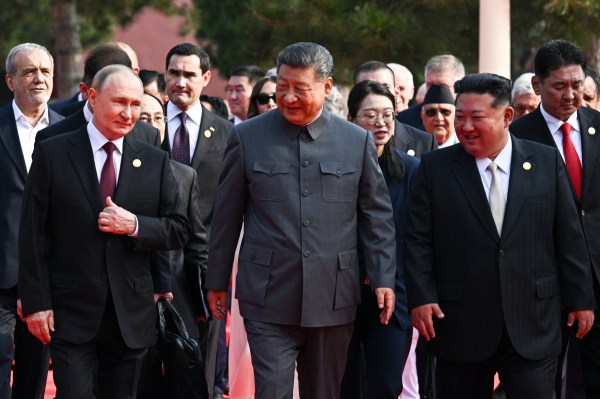“Stop Acting Like This Is Normal,” Ezra Klein chided congressional Democrats in a piece published yesterday in the New York Times.
Funding for the federal government will run out on September 30. Because of the Senate filibuster, new funding can’t pass without at least seven Democratic votes. Sen. Chuck Schumer and his members must use that leverage to impede the president’s ongoing consolidation of power, Klein argued. “Joining Republicans to fund this government is worse than failing at opposition,” he writes. “It’s complicity.”
Stirring words. As for which concessions, specifically, Democrats should seek from Donald Trump to derail the authoritarian project, Klein has … no idea.
“Democrats would have to pick a small set of policies and stick to that,” he wrote. “They would have to choose those policies wisely. They would have to hold the line even when it got tough.” Right, but which policies?
As a non-paying reader, you are receiving a truncated version of Boiling Frogs. You can read Nick's full newsletter by becoming a member here.
In fact, he sounded unconvinced by his own thesis. “I am not certain that Democrats can win a shutdown—I am not certain that they have the leaders that they need,” he admitted at one point. Near the end of his column, Klein concluded, “I’m not going to tell you I am absolutely sure Democrats should shut the government down. I’m not.”
Klein may not have the answers, but he’s asking the right question: How can the opposition not use what little power it has to try to arrest the country’s devolution into a third-world banana republic? He’s stumbled into a recurring Catch-22 of Trump 2.0—the minority party must do something, yet there’s nothing it can do.
I’m familiar with it. Last month I made the case that Democrats should shut down the government to force the White House to restore funding for mRNA research canceled by Robert F. Kennedy Jr. Vaccines are popular, the issue is life-and-death, and Republicans would probably end up divided over it. Democrats could plausibly “win” that shutdown fight in the court of public opinion and force the GOP to concede. There’s a lot to commend the idea.
But a shutdown over mRNA research wouldn’t address the real crisis in America. To pick a fight over a boutique issue like vaccines while Trump declares “war” on American cities, nationalizes private companies, unmoors the military and law enforcement from law, and lines his own pockets is to miss the moment so egregiously as to seem, well, complicit.
Democrats must do something to try to stop it, but Trump would veto any bill that meaningfully limited his executive power. And the pitiful Republican cowards of our Potemkin Congress wouldn’t dare help pass such a bill in the first place lest he accuse them of “treason” for collaborating with Schumer and the left. What’s the way out? How do you meet the moment when you can’t win?
I think Democrats’ least bad option is to focus on tariffs and resign themselves to winning by losing.
Bad politics.
Their chief obstacle to winning a shutdown fight over authoritarianism isn’t Trump or the quisling Republicans in the House and Senate. It’s the apathy of decadent Americans.
We had a national election less than a year ago in which the issue figured prominently, you may recall. Voters didn’t care, certainly not as much as they cared about the price of groceries.
Ask adults if they agree with Sen. Rand Paul that the U.S. military shouldn’t summarily execute people for suspected crimes without due process and most will say yes, I assume. But giving the right answer in a pop quiz on civics and tolerating a weeks- or monthlong government shutdown aimed at reforming that policy are two different things. The lesson of Trump’s reelection is that if voters don’t believe his malfeasance will touch them directly, it will remain a low priority for them relative to issues that do, like inflation.
So if Democrats forced a shutdown aimed at producing concessions on civil liberties, my guess is that the public’s patience for it would be short. Americans will support hardball tactics to pressure the president into being less fascist when his fascism starts to oppress them personally, and not a moment sooner.
The same goes for his scorched-earth policy on slashing funding for foreign aid programs like PEPFAR. Democrats have a strong humanitarian case to use their shutdown leverage to restore that money, but asking Americans to ensure personal inconvenience over tens of thousands of foreigners dying is apt to elicit the same confused head tilt that a dog gives you when you hide its toy behind your back. Between Africans succumbing en masse to AIDS and our National Parks closing for a few weeks, the one the average joe cares more about is the one that touches him directly, I suspect.
Beyond the moral desiccation of the American soul, Schumer’s party has a problem of its own making. It’s squandered so much credibility on matters of basic law enforcement like fighting crime and reducing illegal immigration that forcing a shutdown over those issues could do it more harm than good.
Democrats could, for instance, strike a blow against authoritarianism by declaring that the government won’t be funded until the National Guard has withdrawn from every American city. But that position can and will translate demagogically into “Democrats want to shut down the government because they want higher crime!” (Also, what’s to stop Trump from redeploying the Guard after a funding bill passes?) Ditto for any demands they might make to rein in ICE’s abuses, which the president would frame as a left-wing attempt to restore the border neglect of the Biden years and the rampant illegal immigration it enabled.
In 2020 progressives seized on the aftermath of George Floyd’s murder to call for defunding the police. Their party has been branded with it ever since. Any concessions Democrats seek now that can semi-plausibly be framed as another go at defunding “the police” might end up biting them more than they bite Trump.
We come to a third problem: Some of the authoritarian gambits the president has pursued are ones that leftists, or at least some leftists, support.
I’d be gung ho for a shutdown designed to force the executive branch to disgorge the ownership stakes it coerced from U.S. Steel, Intel, and Nvidia as part of the president’s “socialism without socialism” agenda, but I’m a conservative. Actual socialists won’t be as eager. After the Intel deal was announced, for example, Sen. Bernie Sanders praised the president for having secured a reasonable return on the government’s “investment” in the company. Nationalizing private enterprise is a Trump precedent that left-wing Democrats won’t wish to anathematize by protesting it now with a shutdown.
The same goes for Trump’s habit of extorting institutions that receive federal funding into making ideological concessions in return for their money. Progressives will gleefully exploit that strategy the next time they take power to bully their enemies into favoring their own cultural priorities. They’re not going to pick a fight over how supposedly unacceptable it is now.
All of which leaves few good options. Democrats need to force a confrontation over authoritarianism, as Klein says, but it needs to be a form of authoritarianism that touches Americans directly, that their own party isn’t horribly compromised on, and that they’re not itching to utilize themselves once they’re back in charge.
The answer: tariffs.
Good politics.
Any way you slice it, the politics of Trump’s tariff-palooza are good for the minority party.
Politically: Per one new Democratic survey, 56 percent of likely midterm voters say the policy is hurting the economy. Ominously for the president, 48 percent of the same group say tariffs are hurting them personally. (Even many of his own voters doubt the usefulness of what he’s doing.) This is an issue that reaches every kitchen table, in other words. No wonder that his normally obedient Republican servants in the House and Senate have little to say in his defense on the issue, knowing what sort of backlash from voters might await next fall as the pain deepens.
Economically: It’s getting harder for Trump apologists to pretend that the tariffs aren’t doing more harm than good. Last week’s jobs report was a horror show. Some segments of the economy may already be in a recession. Manufacturing, the sector that was supposed to benefit from reshoring, is tanking as the cost of foreign-made components rises and markets become impossible to predict. Wall Street is getting rich while Main Street suffers, with unemployment among blacks and young adults climbing. A party that shed a bunch of blue-collar support in the last cycle could do worse than have a big fight with the president over the damage he’s doing to American workers.
Diplomatically: Tariffs have already caused one major diplomatic crisis and are contributing to another. America’s relationship with India is in ruins after Trump slapped a 25 percent tax on their imports, then doubled it to punish the country for purchasing Russian oil. South Korea, meanwhile, is furious that hundreds of Korean workers at a Hyundai plant in Georgia were rounded up by ICE. The point of tariffs is to get foreign companies to make products in America, supposedly; how are we supposed to do that, one Korean media outlet asked, if our workers are being arrested?
Legally: The legal authority for Trump’s tariffs is hanging by a thread after a federal appellate court ruled against him last month. The odds of him losing before the Supreme Court are sufficiently high that his deputies have begun considering back-up plans. Tariffs may not be menacing in the way that sending troops to patrol American cities is, but all of the authoritarian pathologies that Klein alludes to in his piece can be found here—dubious claims of “emergency” power at the legislature’s expense, capricious policymaking by autocratic whim, extreme ruthlessness to no strategic end except satisfying the leader’s dim revanchist impulses.
Bad for Americans, bad for foreign relations, bad for the Constitution. All of that makes the tariff issue good for Democrats. If they’re trying to convince the public that it’s stupid to let a former game-show host make law by royal decree, zeroing in on an issue where those decrees are making the average joe’s life meaningfully worse seems like the obvious way to go.
Schumer could make a simple demand of Senate Majority Leader John Thune, then: It’s time to repeal the various tariff powers that Congress has granted to the president over the years. Not just the International Emergency Economic Powers Act, the law Trump is currently using to justify his policy, but also those “back-up” statutes I mentioned. The Constitution gives the legislature, not the executive, the power to levy taxes. The moment has come for us to reclaim that authority, Schumer might say.
“Trump and Thune would never agree to that,” you’ll reply. Yes, I’m aware.
That’s what I meant earlier when I referred to “winning by losing.” The point of a shutdown over tariffs wouldn’t be to get Republicans to capitulate. They won’t. It would be to focus the public on the damage Trump is causing to the economy at the very moment that the issue is beginning to ripen.
“The case for a shutdown is this: A shutdown is an attentional event,” Klein writes. “It’s an effort to turn the diffuse crisis of Trump’s corrupting of the government into an acute crisis that the media, that the public, will actually pay attention to.” After a few weeks of government paralysis, Democrats would inevitably throw in the towel and agree to a clean funding bill. But by treating Trump’s tariff powers as a national crisis worthy of a shutdown, they’d throw a media spotlight on what he’s doing to U.S. companies and prime Americans to interpret any economic downturn to come before the midterms as the fruit of the president’s idiotic policies.
That’s winning by losing. They’d “lose” the shutdown insofar as their demands wouldn’t be met, but they’d win by cornering Republicans on an issue that will strongly inform midterm voters’ views of the economy. “We tried to stop him,” Schumer might say next year, “but it’s clear now that he won’t be stopped unless Democrats control Congress.” If I were him, I wouldn’t even present the shutdown as a partisan standoff; I’d try to drive a wedge into the right by presenting it as a separation of powers issue and invite Senate Republicans to join with Democrats in taking away Trump’s matches before he starts any more fires on trade.
If John Thune and Ted Cruz and Susan Collins won’t go for that—and they won’t, because they’re quislings—they should have to spend a few weeks doing uncomfortable interviews in which they explain why a power granted to their branch under Article I should be wielded arbitrarily by a mercantilist crank bent on turning America into a Peronist laughingstock. Force them, not just the president, to own his power grab. Let voters understand before November 2026 that imperial tariffs are a Republican policy, not merely a Trump one.
The downside.
In theory, a shutdown to protest tariffs might not work for the same reason that a shutdown to protest the White House nationalizing companies wouldn’t. Too many leftists admire protectionism for Democrats to feel politically safe in waging war on it.
That’s not as true as it used to be, though. A Gallup poll taken earlier this year found all three partisan groups sky-high in their belief that free trade presents an opportunity for growth more so than a threat to the economy, and Democrats were highest of all. Fully 86 percent of Schumer’s party held that opinion. Even the pinko faction isn’t as pinko as Trump anymore: Bernie Sanders, who sounded bullish years ago about presidential tariffs, savaged the White House this year after “Liberation Day.”
The downside of a shutdown over tariffs isn’t that it would divide the left. It won’t. It’s that it would make Democrats a potential scapegoat for the eventual “Trump recession.”
The economy was doing fine until Schumer cut off federal spending, Republicans will insist in October 2026. That’s not true, but Americans have developed a marvelous knack for believing things they want to believe, whether they’re true or not. If you voted for the president last year because you thought he had an economic Midas touch, which theory will be more appealing to you if unemployment starts rising: That you were and are an idiot, or that MAGA Peronism certainly would have worked if not for the Democrats’ shutdown?
It’s a real conundrum for the minority party. If they use the tiny bit of leverage they have over policy to disrupt the economy later this month, they’ll be demagogued mercilessly for it. And our decadent electorate might be swayed by that.
But I agree with Klein that Democrats will need to risk it. Doing nothing isn’t an option this time.
“Enthusiasm matters. Trust matters,” he writes, pointing to the party’s abysmal approval ratings. “Democrats don’t just need people to want them to win; they need people willing to help them win. … Why would you approve of or donate to the Democratic Party right now? If you are frightened or appalled by what is happening, what are Democrats offering you?”
They’re in an impossible spot. To halt authoritarianism they need a partner somewhere in electoral politics and they don’t have one. The president cares only about power; Republican lawmakers care only about holding their seats; Americans care mostly about cheaper groceries. Democrats can’t “win” a shutdown because no one will join them to apply the immense political pressure it would take to get Trump to fold.
But they can win even in losing if their effort galvanizes enthusiasm among demoralized liberals and convinces the wider population that Trump’s tariffs are a cancer on the economy. Force the president and (more importantly) his party to defend a policy that’s indefensible on the merits, no matter how the merits are defined, and show the Resistance that you’re willing to resist. That’s the most the left can hope for.








Please note that we at The Dispatch hold ourselves, our work, and our commenters to a higher standard than other places on the internet. We welcome comments that foster genuine debate or discussion—including comments critical of us or our work—but responses that include ad hominem attacks on fellow Dispatch members or are intended to stoke fear and anger may be moderated.
With your membership, you only have the ability to comment on The Morning Dispatch articles. Consider upgrading to join the conversation everywhere.